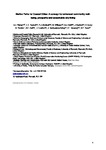Marine parks for coastal cities: A concept for enhanced community well-being, prosperity and sustainable city living
| dc.contributor.author | Pittman, S | |
| dc.contributor.author | Rodwell, L | |
| dc.contributor.author | Shellock, R | |
| dc.contributor.author | Williams, M | |
| dc.contributor.author | Attrill, M | |
| dc.contributor.author | Bedford, J | |
| dc.contributor.author | Curry, K | |
| dc.contributor.author | Fletcher, S | |
| dc.contributor.author | Gall, S | |
| dc.contributor.author | Lowther, J | |
| dc.contributor.author | McQuatters-Gollop, AL | |
| dc.contributor.author | Moseley, K | |
| dc.contributor.author | Rees, S | |
| dc.date.accessioned | 2019-03-04T14:05:29Z | |
| dc.date.issued | 2019-03-01 | |
| dc.identifier.issn | 0308-597X | |
| dc.identifier.issn | 1872-9460 | |
| dc.identifier.uri | http://hdl.handle.net/10026.1/13403 | |
| dc.description.abstract |
Coastal cities continue to experience rapid urbanisation and population growth worldwide, linked to the diverse economic and social benefits flowing from proximity to the sea. Growing concern over human impacts upon coastal waters and global strategic goals for healthier cities requires that coastal cities develop innovative ways to inspire and empower communities to embrace and cherish city seascapes. Coastal city communities have much to gain from a healthier relationship with the sea. This paper proposes a collaborative community-led marine park concept that celebrates a city's connection to the marine environment, enhances sustainable economic prosperity and enables communities to participate in activities that deepen understanding, value, care and enjoyment of the city seascape. A city marine park (CMP) is not a marine protected area because it does not have biodiversity and heritage protection or ecosystem governance as a primary goal and does not aim to restrict human activities. A CMP enables city communities to collaborate towards a shared vision of elevated status and value for the city seascape. A CMP considers socio-economic and geographical context, including land-sea connectivity, and is integrated within a coastal city's strategic urban planning. This paper highlights core themes of a CMP and the diverse and wide-ranging benefits from coordinated activities that better connect the city community with its seascape. If co-created by the coastal city community and civic leaders, a CMP will form an enduring spatial nexus for progress toward healthy cities addressing multiple interlinked global sustainable development goals. | |
| dc.format.extent | 160-171 | |
| dc.language | en | |
| dc.language.iso | en | |
| dc.publisher | Elsevier | |
| dc.subject | Marine park | |
| dc.subject | Coastal cities | |
| dc.subject | City seascape | |
| dc.subject | Blue health | |
| dc.subject | Blue urbanism | |
| dc.subject | Sustainable development goals | |
| dc.title | Marine parks for coastal cities: A concept for enhanced community well-being, prosperity and sustainable city living | |
| dc.type | journal-article | |
| dc.type | Article | |
| plymouth.author-url | https://www.webofscience.com/api/gateway?GWVersion=2&SrcApp=PARTNER_APP&SrcAuth=LinksAMR&KeyUT=WOS:000463125700019&DestLinkType=FullRecord&DestApp=ALL_WOS&UsrCustomerID=11bb513d99f797142bcfeffcc58ea008 | |
| plymouth.volume | 103 | |
| plymouth.publication-status | Published | |
| plymouth.journal | Marine Policy | |
| dc.identifier.doi | 10.1016/j.marpol.2019.02.012 | |
| plymouth.organisational-group | /Plymouth | |
| plymouth.organisational-group | /Plymouth/Faculty of Arts, Humanities and Business | |
| plymouth.organisational-group | /Plymouth/Faculty of Arts, Humanities and Business/School of Society and Culture | |
| plymouth.organisational-group | /Plymouth/Faculty of Science and Engineering | |
| plymouth.organisational-group | /Plymouth/Faculty of Science and Engineering/School of Biological and Marine Sciences | |
| plymouth.organisational-group | /Plymouth/Faculty of Science and Engineering/School of Geography, Earth and Environmental Sciences | |
| plymouth.organisational-group | /Plymouth/PRIMaRE Publications | |
| plymouth.organisational-group | /Plymouth/REF 2021 Researchers by UoA | |
| plymouth.organisational-group | /Plymouth/REF 2021 Researchers by UoA/UoA07 Earth Systems and Environmental Sciences | |
| plymouth.organisational-group | /Plymouth/REF 2021 Researchers by UoA/UoA14 Geography and Environmental Studies | |
| plymouth.organisational-group | /Plymouth/REF 2021 Researchers by UoA/UoA18 Law | |
| plymouth.organisational-group | /Plymouth/Research Groups | |
| plymouth.organisational-group | /Plymouth/Research Groups/Marine Institute | |
| plymouth.organisational-group | /Plymouth/Users by role | |
| plymouth.organisational-group | /Plymouth/Users by role/Academics | |
| plymouth.organisational-group | /Plymouth/Users by role/Researchers in ResearchFish submission | |
| dcterms.dateAccepted | 2019-02-11 | |
| dc.rights.embargodate | 2020-9-1 | |
| dc.identifier.eissn | 1872-9460 | |
| dc.rights.embargoperiod | Not known | |
| rioxxterms.versionofrecord | 10.1016/j.marpol.2019.02.012 | |
| rioxxterms.licenseref.uri | http://www.rioxx.net/licenses/all-rights-reserved | |
| rioxxterms.licenseref.startdate | 2019-03-01 | |
| rioxxterms.type | Journal Article/Review | |
| plymouth.funder | Plankton science for supporting the implementation of marine ecosystem-based management and conservation::NERC | |
| plymouth.funder | Plankton science for supporting the implementation of marine ecosystem-based management and conservation::NERC | |
| plymouth.funder | Plankton science for supporting the implementation of marine ecosystem-based management and conservation::NERC | |
| plymouth.funder | Plankton science for supporting the implementation of marine ecosystem-based management and conservation::NERC |


